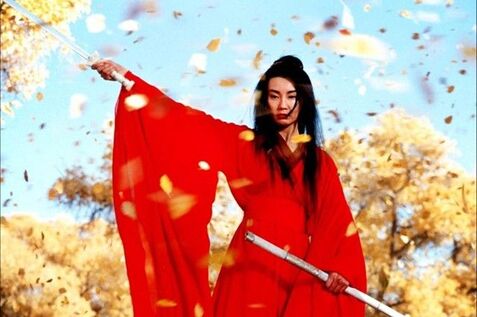B+ | A king is approached by a man claiming to have killed three assassins who have been chasing the king for years. Directed by Zhang Yimou Starring Jet Li, Tony Leung, and Maggie Cheung Review by Jon Kissel |

Of the four Zhang Yimou films I’ve seen, including Hero, one (The Great Wall) is a Michael Bay-style propaganda film for Chinese values, another (Coming Home) is a furious denunciation of Mao’s Cultural Revolution, and the third (Shadow) is a semi-impenetrable medieval story of back-stabbing and double crosses that is perhaps about bottom-up class warfare. Needless to say, Zhang’s hard to pin down. Reconciling Hero, with its praise of centralization and one unifying language, and Coming Home, with its cruelty only being possible thanks to a powerful central government, is a tough task. What would a Uighur Muslim think of the King of Qin’s arguments, or a Hong Kong democracy activist? What would Leni Riefenstahl think of Hero as another entry into cinematic propaganda, a film whose title could arguably be applied to the warlord who’s taking his unstoppable army into surrounding countries based on a goal of uniting a race of people under one banner?
On the other hand, film is used as propaganda because, in talented hands, it works, and Hero is bursting with talent. All the main actors convey a stoicism appropriate for a humorless film, and there’s few actors better at giving nuance to placid features than Leung and Cheung, plus Zhang Ziyi as Sword’s student Moon. Li and Yen are capable physical presences, but the other three are more than that. Wu xia choreographer Ching Siu-tung could conceivably make any actor look like a god as they perform routines in takes that last far longer than expected, but only Leung can wipe a drop of water off of Snow’s face with all that burdensome pathos. Leung, Cheung, and Zhang are all introduced with incredible tableaus in a red-clothed calligraphy school, photographed by Christopher Doyle who also shot all-timer In the Mood For Love. One could be forgiven for just taking Hero in as a sensory experience, because as those go, it simultaneously works on an intimate and a spectacular level.
As much as I want to only associate Hero with Cheung’s Snow swirling through a tornado of autumnal leaves, there’s just no way to ignore the overt political throughline. This peace-through-strength crap has been plaguing the American system for a century of military-industrial giveaways, and I’ve had enough of it. As I wrote in my review of The Great Wall, it’s not like America doesn’t do hagiographic movies about its own history and I wouldn’t begrudge China the same allowance. Here, the sentiment is grosser than a reminder of China’s impressiveness during a period of European brutality or something about the usefulness of fighting as a coherent unit. Whatever one could say about the hypocrisy of America or the failure to live up to its professed values, the values themselves are worthy. In Hero, the value is itself corrupt. The film makes a reluctant savior of a warlord, turning him into a wise poet who’s flattening a complex world into one single entity, where self-determination is anathema and counter to some idea about the ‘single nation’ of China that obviously means different things to different regions and generations. Hero is a film I love for its surface appeals and its connections between the characters, but there’s something rotten and ugly inside it. C+
 RSS Feed
RSS Feed